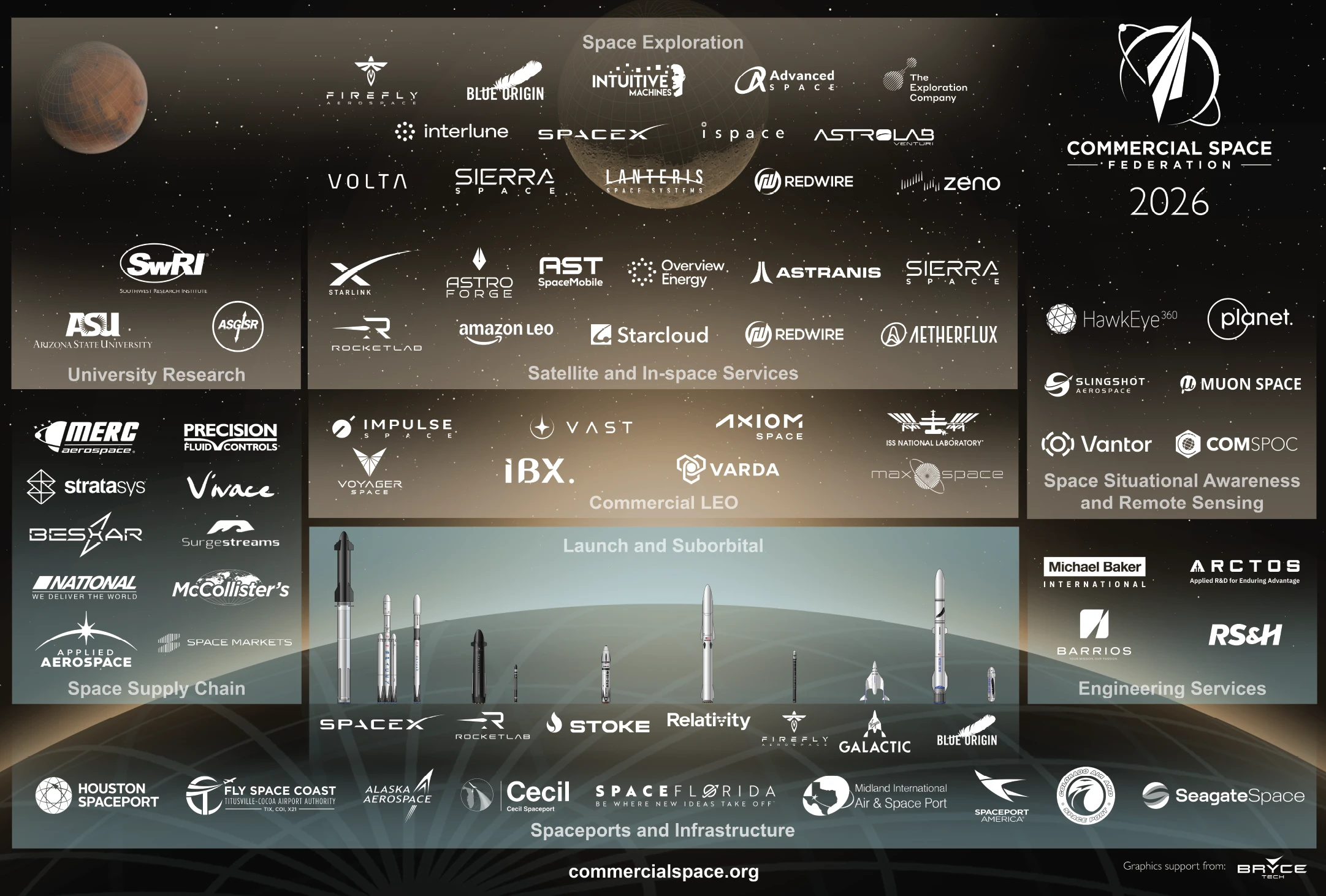August 13, 2025 – Washington, D.C.— The Commercial Space Federation (CSF) congratulates President Trump for signing an Executive Order on “Enabling Competition in the Commercial Space Industry.” CSF President Dave Cavossa stated, “CSF applauds President Trump and the leaders across the Federal Government for taking bold action to prioritize space. Building upon the work of his first administration, today’s executive order reorganizes key aspects of the FAA and Department of Commerce and provides regulatory relief to unleash the U.S. commercial space industry. With these actions, it is clear that President Trump is serious about maintaining U.S. dominance in space in the face of growing international competition, especially from China. This executive order will strengthen and grow the U.S. commercial space industry by cutting red tape while maintaining a commitment to public safety, benefitting the American people and the U.S government that are increasingly reliant on space for our national and economic security.”
This Executive Order promotes competition and innovation throughout the commercial space industry. It supports more efficient and streamlined licensing of launch and reentry operations, encourages the infrastructure development of U.S. spaceports, provides the oversight framework to enable innovative in-space activities, and recognizes the importance of commercial space within both the Department of Commerce and the Department of Transportation. Each of these actions are critical steps towards unleashing the U.S. commercial space industry in support of economic development, national security, and scientific research and development, bolstering American industry in the face of growing competition from China.
Key provisions of the Executive Order include:
- Reforming Regulatory Barriers to Commercial Launch and Reentry:
- The Secretary of Transportation, in consultation with the Chair of the Council on Environmental Quality, is directed to use all available authorities to eliminate or expedite the Department of Transportation’s (DOT) environmental reviews and all obstacles to the granting of launch and reentry licenses and permits. CSF supports responsible space launch and infrastructure development activities that consider impacts to the environment. However, the current DOT environmental review process is overly cumbersome and time-consuming and frequently results in duplicative reviews of similar activities which have no identifiable negative impact on the environment. This provision will grant regulatory relief and allow for greater launch cadence and infrastructure development.
- The Secretary of Transportation is directed to reevaluate, amend, or rescind the regulations within Part 450 of title 14, Code of Federal Regulations. Though intended to streamline launch and reentry regulations, the implementation of Part 450 has resulted in significant regulatory burdens on U.S. industry, as noted by CSF President Dave Cavossa in his testimony last year before the Subcommittee on Space and Aeronautics of the House Committee on Science, Space, and Technology. CSF looks forward to working with the Secretary of Transportation to identify key improvements to the Part 450 rule while maintaining public safety.
- Reforming Regulatory Barriers to Next Generation Spaceport Infrastructure:
- The Executive Order includes multiples provisions that will provide regulatory relief and increased development of American spaceports. Access to space from multiple locations in the U.S. is critical to national security and continued growth of the commercial space industry. CSF welcomes these actions to reduce barriers to spaceport development and growth.
- Novel Space Activity Authorization:
- The Secretary of Commerce is directed to propose a process within 150 days for authorizing non-governmental missions in space which are not currently regulated by any federal agency. While multiple federal agencies provide oversight of commercial space operations, no agency holds the authority to oversee the most innovative in-space activities, requiring affected operators to navigate a complex interagency process to gain approval for their operations. This bold action clarifies federal oversight by directing the Department of Commerce to provide authorization and continuing supervision of these activities, allowing industry to deploy groundbreaking technologies and providing clarity to investors. CSF has long advocated for the Department of Commerce to implement a streamlined oversight regime that enables continued growth and development of the American commercial space industry.
- Reforming Regulatory Leadership and Accountability:
- The Secretary of Transportation is required to establish a position within the Office of the Secretary with the responsibility of advising the Secretary on fostering innovation and deregulation in the commercial space industry, and to direct the Administrator of the Federal Aviation Administration to appoint a senior executive noncareer employee to be the Associate Administrator for Commercial Space Transportation (AST). This action will ensure that AST leadership is more responsive to industry concerns and will enhance the status of commercial space issues within the Office of the Secretary of Transportation.
- The Secretary of Commerce is directed to elevate the Office of Space Commerce into the Office of the Secretary within 60 days. As CSF has noted in the past, this action empowers OSC to lead interagency deliberations within the government in promotion of commercial space interests.
About CSF
The Commercial Space Federation (CSF) is the leading trade association representing the commercial space industry. We serve as the industry’s voice to policymakers in the U.S. government, international governments and organizations, the media, and the public, advocating for policies that support growth and innovation in the space economy. CSF’s members comprise multiple sectors of the commercial space industrial base, including launch and reentry operations, commercial LEO services, remote sensing and analytics, satellite services, spaceports and infrastructure, commercial lunar and space exploration, space situational awareness (SSA), and space supply chain services.
